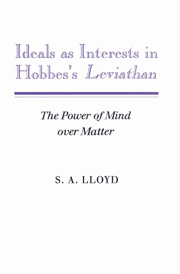Book contents
- Frontmatter
- Contents
- Acknowledgments
- A note on references
- Introduction
- 1 The standard philosophical interpretation
- 2 Hobbes's compositive reconstruction, phase one: identification of the principle of political obligation
- 3 Compositive reconstruction, phase two: religion and the redescription of transcendent interests
- 4 Hobbes's mechanism for the reproduction of social stability
- 5 Hobbes's resolutive analysis, phase two: part 4 of Leviathan
- 6 Theory in practice: Leviathan and Behemoth
- 7 Hobbes's resolutive analysis, phase one: design and detail
- 8 The treatment of transcendent interests
- 9 Hobbes's absolutism
- Notes
- Index
- Frontmatter
- Contents
- Acknowledgments
- A note on references
- Introduction
- 1 The standard philosophical interpretation
- 2 Hobbes's compositive reconstruction, phase one: identification of the principle of political obligation
- 3 Compositive reconstruction, phase two: religion and the redescription of transcendent interests
- 4 Hobbes's mechanism for the reproduction of social stability
- 5 Hobbes's resolutive analysis, phase two: part 4 of Leviathan
- 6 Theory in practice: Leviathan and Behemoth
- 7 Hobbes's resolutive analysis, phase one: design and detail
- 8 The treatment of transcendent interests
- 9 Hobbes's absolutism
- Notes
- Index
Summary
What good is it to promise allegiance and then by and by to cry out, as some ministers did in the pulpit, To your tents, O Israel!?
–Hobbes (B 181)Human beings will fight for their beliefs. People go to war over their moral ideals and religious principles, and are capable not only of risking death in the service of their values but even of embracing death when they believe it will further their cause. The Christian martyrs, Buddhist monks in Vietnam, and some Shiite Muslims in Lebanon today are among countless examples of the human capacity for pursuing religious or moral convictions even at the expense of one's own life. People are capable of forming, and acting on, transcendent interests. Of pursuing principles over preservation. Of exerting mind over matter.
We all know this. Hobbes knew it too, and it worried him deeply. It worried him because he believed that transcendent interests very often cause civil wars.
It is difficult to call to mind any modern war that did not contain as one element moral or religious transcendent interests. Correctly or incorrectly, combatants usually view themselves as engaged in a struggle for some value of overriding importance, such as liberty, equality, human dignity, or true religion. Their struggle appears to them in the form of a struggle for right. As the French Revolution, the American Civil War, and the Russian Revolution suggest, civil wars are no exception to this rule.
- Type
- Chapter
- Information
- Ideals as Interests in Hobbes's LeviathanThe Power of Mind over Matter, pp. 1 - 5Publisher: Cambridge University PressPrint publication year: 1992



